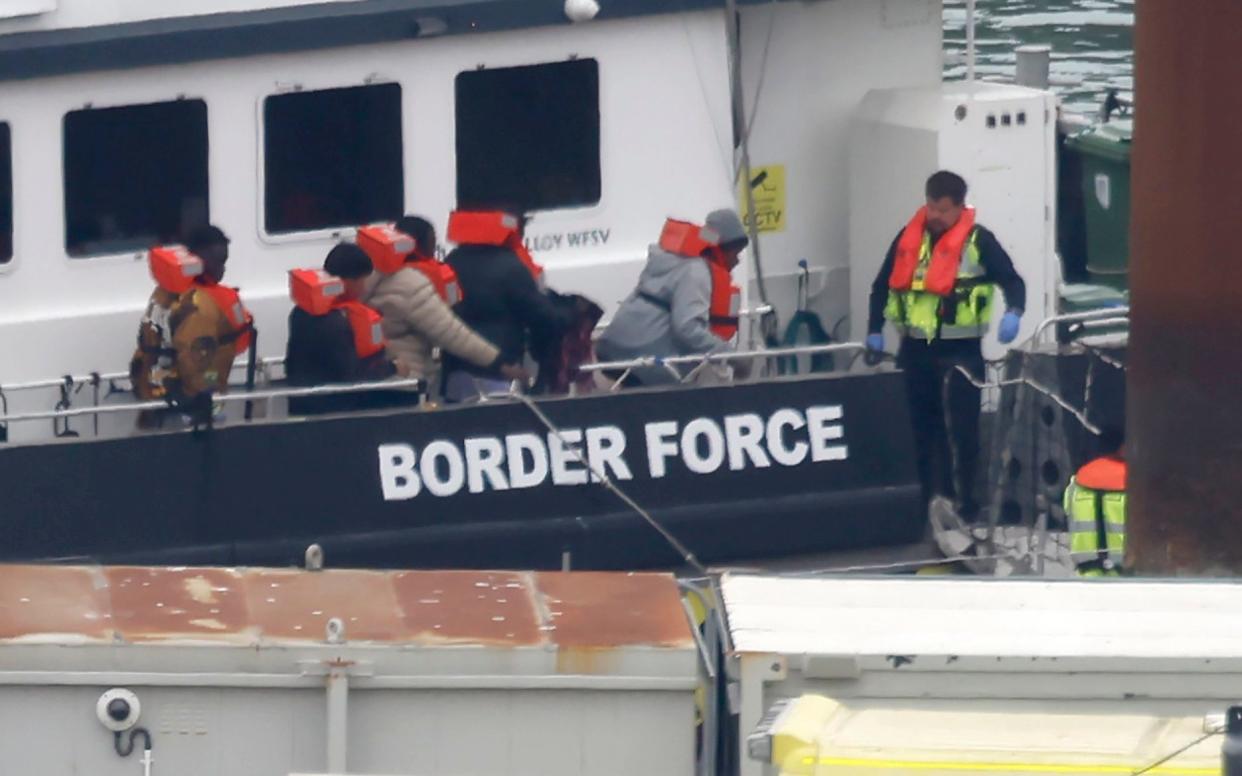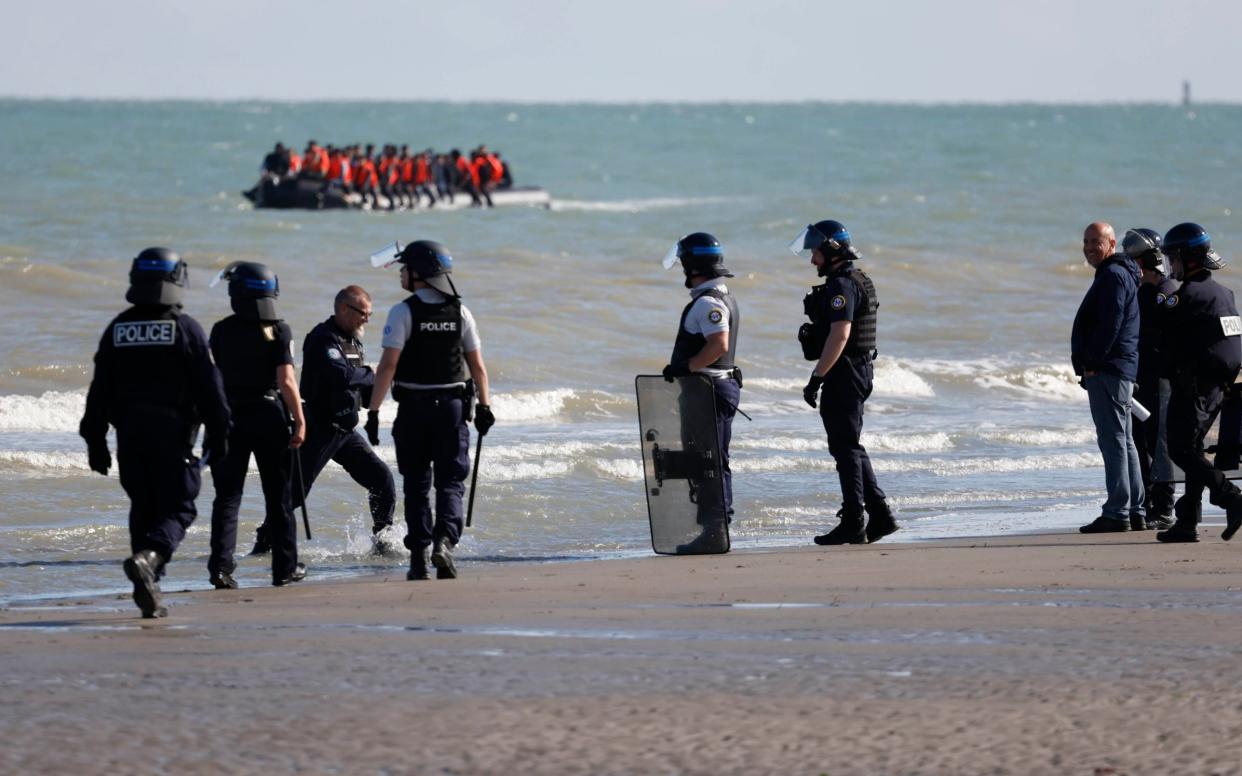Border Force takes Channel migrants to France for first time as Starmer seeks Europe returns deal

Border Force took migrants rescued from the Channel back to France for the first time on Thursday as the Prime Minister said he wants an asylum seeker returns deal with Europe.
In an unprecedented step, a British vessel transported the 13 asylum seekers to Calais, signalling closer Anglo-French cooperation on the small boats crisis.
It came as Sir Keir Starmer said he is also ready to explore sending migrants intercepted in the Channel to countries abroad to have their asylum applications decided.
He made the remarks as he hosted a major summit of European leaders at Blenheim Palace which was focused on tackling illegal migration across the continent.
The leaders gathered hours after a major rescue operation was launched in the Channel to save more than 70 migrants who got into trouble after setting off from northern France.
One migrant died as 71 saved in operation
The Border Force catamaran Ranger assisted in the rescue, which was in French waters, then returned 13 asylum seekers to Calais at the request of French authorities.
One migrant died and a further 71 were saved from the water in the joint Anglo-French operation, launched after their boat deflated.
France usually demands any migrants rescued by Border Force vessels are taken to the UK, and has long resisted calls by Conservative politicians for rescued migrants to be returned to France to deter further attempts to cross the Channel.
Home Office sources confirmed it was the first time a British Border Force vessel had taken migrants back to France, but said it was not a change of policy.
It is understood that UK Government officials see it as an example of how Sir Keir’s attempt to reset relations with Europe is already working.
The French interior ministry said it was standard practice under maritime law for operational commanders to direct any vessel with rescued people on board to the nearest port which was Calais.

At a press conference later, the Prime Minister said he still wants a returns agreement with the European Union, though he played down the chances of a swift deal.
On Thursday night, Sir Keir had dinner with Emmanuel Macron, the French president, and presented his plan to crack down on small boat crossings at dinner with Mr Macron.
The Prime Minister’s spokesman said: “The Prime Minister and president expressed their condolences for the victims of the tragic events in the channel yesterday and last week.
“They committed to strengthening their cooperation on irregular migration and the fight against criminal gangs responsible for this tragic loss of life through small boat crossings.
“The Prime Minister presented the UK’s new Border Security Command and the vital role it will play in this mission.”
Asked before the dinner if he would raise a deal to return small boat arrivals to the continent, Sir Keir said: “The returns agreement only comes into being at the end of the process. My focus is at the beginning of the process to make sure we actually secure our borders.”
He insisted Britain would not join the EU’s own internal agreement on migrant returns, which would require the UK to accept asylum seekers from Europe.
German leader welcomes warmer relations
Mr Macron ruled out the possibility of a direct deal with France to return migrants, insisting that any agreement must be between Britain and the EU.
“We speak about people coming from the rest of the world and we will not take the full burden of those who are going through France to join the UK,” he said.
However, the Prime Minister received a boost from Olaf Scholz, the German chancellor, who signalled his backing for an EU agreement on the back of warmer relations with Labour.
“It is too early now to go into the details but there is a willingness to solve every question that needs to be solved in order to have good relations,” Mr Scholz said.
Earlier, Yvette Cooper had refused to rule out that Britain could take in asylum seekers in any returns deals brokered with Europe.
The Home Secretary told the BBC that the focus would be on “security” and “organised crime” when repeatedly pressed on what a potential UK-EU deal could entail.
Sir Keir is already facing pressure over his approach to the small boats crisis with large numbers of migrants having arrived on Britain’s shores in his first two weeks in office.
The latest Home Office figures show 427 people arrived on Monday in seven boats, taking the provisional total for 2024 to date to 14,759, a record high at this point in the year.
Albania-style pact not ruled out
The Prime Minister also held talks on Thursday with Edi Rama, the leader of Albania, and the pair discussed Albania’s “innovative” migration deal with Italy.
Under the pact, migrants rescued in the Mediterranean are sent to centres in Albania where their asylum applications are processed by Italian officials.
Asked whether the UK was considering striking similar pacts with other countries, Sir Keir said: “Obviously there’s interest in how that might work. I’m a practical person, I’m a pragmatist, and I’ve always said we’ll look at what works.
“Where cases can be processed closer to origin then that’s something which of course ought to be looked at.”
Sir Keir joined a migration working group hosted by Mr Rama and Giorgia Meloni, the Italian premier, which was also attended by Mr Scholz.
He said afterwards that the group discussed joint efforts to bear down on cross-border smuggling gangs, including intelligence sharing.
“I felt there was a real sense of progress,” he said.
Sir Keir used his press conference to announce £84 million of new foreign aid spending in Africa and the Middle East to tackle the root causes of migration.
He said the cash would be used to help job creation and education opportunities, adding that “this is a vital part of gripping the migration crisis”.
“We are facing up to the huge problems beyond our shores, because these problems echo at home,” the Prime Minister said. “The effects play out on our streets and in a dangerous world we serve no one and solve nothing by turning inward.”
The move will be seen as another major olive branch to Mr Macron, who has repeatedly spoken of the need for Europe to invest in stopping migration at source.
Sir Keir also unveiled new deals with Slovakia and Slovenia, which both lie on the Balkan migration route, to cooperate more closely on tackling smuggling gangs.
Rwanda plan ‘a dereliction of duty’
But the Prime Minister also warned that “there are no silver bullets, nothing is going to solve this overnight” as he piled the blame on the Tories.
He said that he had been “left in a really difficult position” by Rishi Sunak, describing his predecessor’s focus on the Rwanda plan over other solutions as “a dereliction of duty”.
The Blenheim summit has signalled a significant shift in post-Brexit relations, with the Prime Minister pushing for much closer ties with Europe.
He said he wanted to improve on Boris Johnson’s Brexit trade deal as part of a wider reset that will also include a new defence and security pact with the EU.
“I do think there’s a closer relationship to be had that includes trade, includes education and research, and includes security,” he said. “My strong impression is that we’ve been able to make some real progress today.”
His approach was welcomed by EU leaders at the summit.
Charles Michel, the EU Council President, backed Labour’s calls for a joint EU-UK summit in Brussels to discuss closer ties between Britain and the bloc.
“I believe that the UK and the EU working together as sovereign partners are a powerful force for good across our continent,” he said.
Mr Macron said Sir Keir’s promise of a reset was “a great occasion for all of us to deliver concrete results and positive results”.
Meanwhile, Simon Harris, Ireland’s premier, called Labour’s election victory a “game changer” for UK-EU relations.
“You have a British Government that wants to actively talk about a closer relationship with Europe, the importance of multilateralism, staying within the ECHR, working closely with Ireland, he added.
“So it’s a very different landscape to the one we would have been discussing were we standing here only weeks ago.”
Josep Borrell, the EU’s top foreign diplomat, welcomed the “new tone of the British Government” and said the bloc was ready to “reinforce our foreign and security policy co-operation”.


